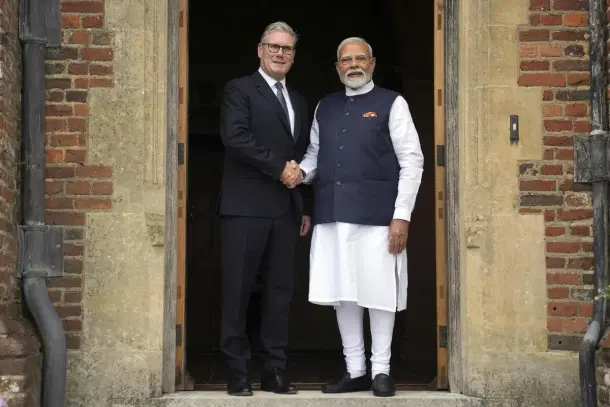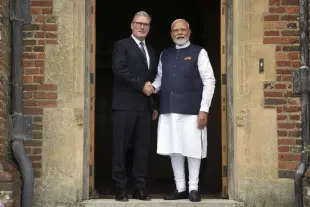News Brief
Duty-Free Access For 99 Per Cent of Indian Exports, Major Gains For Key Sectors: India, UK Sign Historic FTA—Key Highlights
Arzoo Yadav
Jul 24, 2025, 04:47 PM | Updated 04:47 PM IST
Save & read from anywhere!
Bookmark stories for easy access on any device or the Swarajya app.


India and the United Kingdom on Thursday (24 July) signed a historic Free Trade Agreement (FTA), aiming to double bilateral trade to $120 billion by 2030, reported NDTV.
The pact, called Comprehensive Economic and Trade Agreement, was signed by Commerce Minister Piyush Goyal and UK Trade Secretary Jonathan Reynolds in the presence of Prime Minister Narendra Modi and UK Prime Minister Keir Starmer in London.
Indian Farmers, Exporters to Gain Big From Duty-Free Access
The agreement provides duty-free access for Indian agricultural and processed food products like turmeric, pepper, cardamom, mango pulp, pickles, and pulses in the UK market.
After the signing of the pact, PM Modi said, “The focus will be on furthering prosperity, growth and boosting job creation for our people. A strong India-UK friendship is essential for global progress.”
UK will also gain access to the vast Indian market under the pact.
"Duty-free access for about 99 per cent of Indian exports unlocks nearly $23 billion in opportunities for labour-intensive sectors, marking a new era for inclusive and gender-equitable growth," Goyal said in a post on X.
However, the government has protected sensitive Indian sectors as there will be no tariff concessions on dairy, apples, oats, and edible oils.
The fisheries sector, especially in Andhra Pradesh, Odisha, Kerala, and Tamil Nadu, will benefit from zero-duty access to British market for shrimp, tuna, and fishmeal and feeds exports, which currently attract duties ranging from 4.2 per cent to 8.5 per cent in the UK.
Tariff Cuts, Market Expansion, and Investment Gains
According to Indian officials, 99 per cent of India’s exports to the UK—textiles, generic drugs, leather goods, chemicals—will now face zero tariffs.
India will slash 90 per cent of its tariff lines and reduce average UK product tariffs from 15 per cent to 3 per cent.
Scotch whisky tariffs will fall to 75 per cent immediately and 40 per cent in 10 years.
The cost of cars imported from the UK will also reduce. Other imported goods, such as medical devices, will also be cheaper in India now.
Tariffs on EVs will reduce from 110 per cent to 10 per cent under a quota-based tariff reduction.
UK PM Starmer called it a “landmark deal” that creates thousands of British jobs, unlocks new opportunities for businesses and puts money in the pockets of working people.”
The UK will welcome nearly 6 billion British pounds in Indian investment, creating 2,200 British jobs.
Both sides also agreed on chapters for procurement, financial services, and intellectual property.
Also Read: Japanese Auto Giant Denso To Invest Rs 250 Crore To Set Up EV Component Unit In UP




